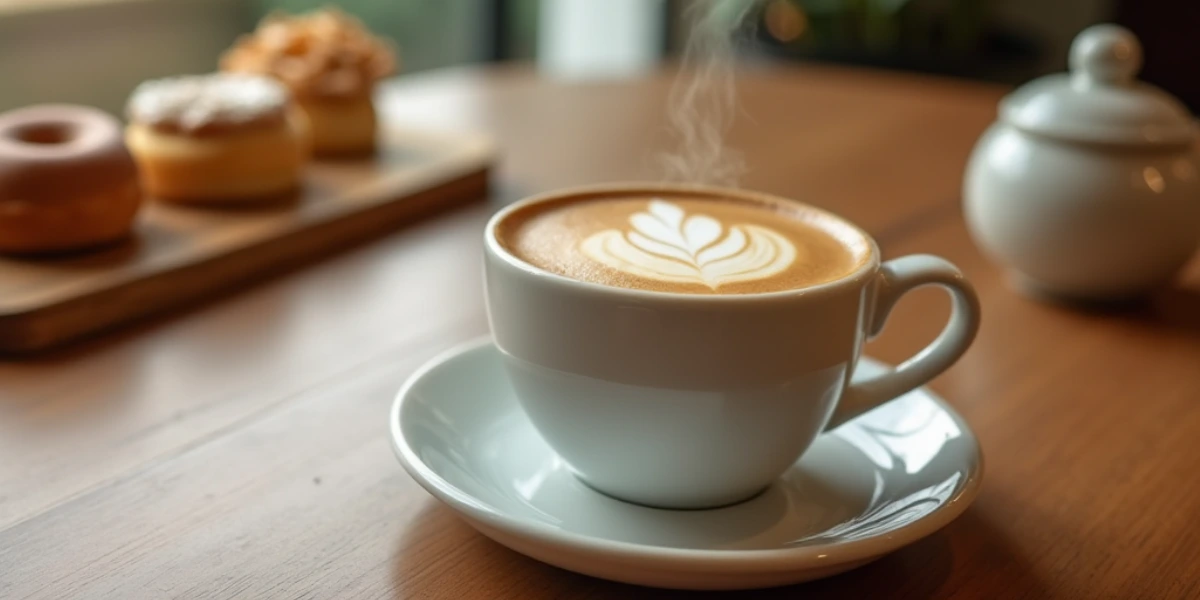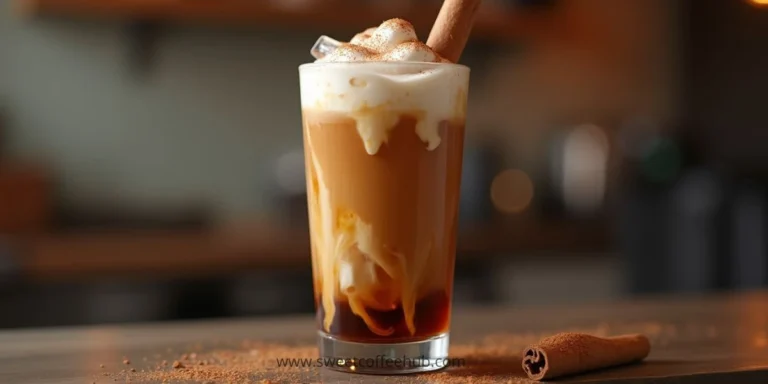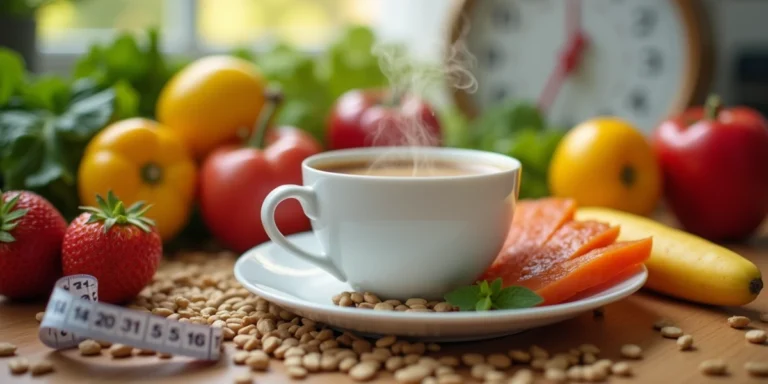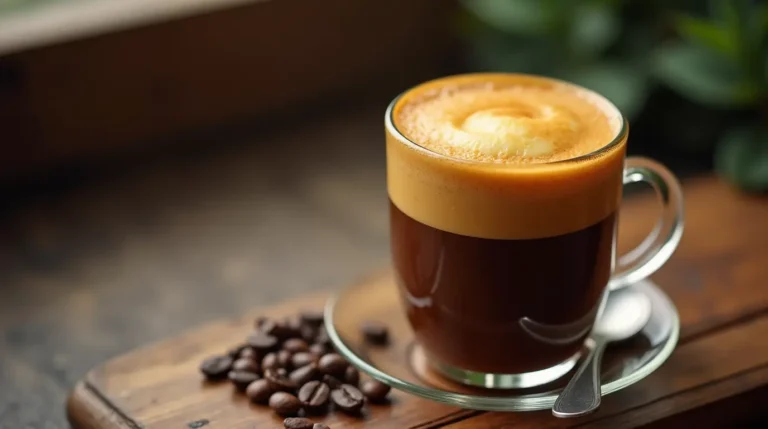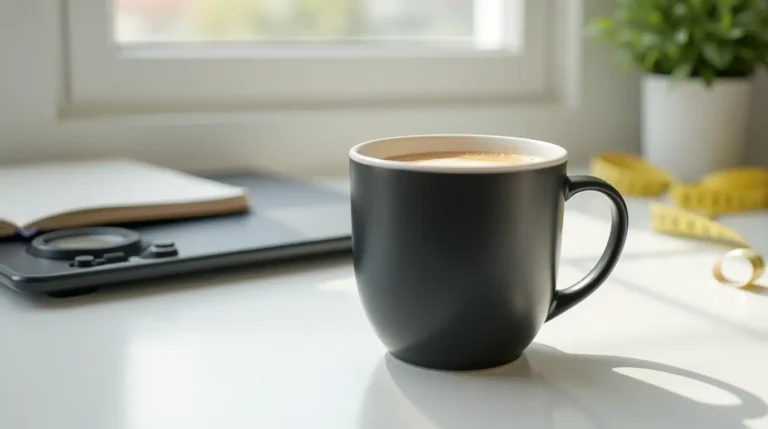Is Decaf Coffee Right for You? Benefits, Myths, and Surprising Facts Explained
Thinking about switching to decaf coffee? You might wonder what makes it different from regular coffee. Decaf coffee, or caffeine-free coffee, is becoming more popular. Many people choose it for its health benefits.
With so many best decaf coffee brands out there, picking the right one can be tough.
Decaf coffee is more than a trend; it’s a lifestyle choice for many. You might want a coffee that tastes great but doesn’t have caffeine. Or maybe you’re sensitive to caffeine or just want a change. Decaf coffee is definitely worth trying.
In this article, we’ll explore decaf coffee’s benefits, myths, and facts. We aim to help you decide if it’s the right choice for you.
Table of Contents
What Makes Decaf Coffee Different
Switching to decaf coffee might make you wonder what’s different. The decaf coffee process is key to its unique traits. Unlike regular coffee, decaf coffee has most of its caffeine removed. This process changes the coffee’s chemical makeup, making decaf coffee stand out.
The history of decaffeination started in the early 20th century. Since then, many methods have been developed for high-quality decaf coffee. Organic decaf coffee is a popular choice. It’s made from beans grown without synthetic pesticides or fertilizers. This is perfect for those who want a natural product.

- Lower caffeine content: Decaf coffee has less than 0.1% caffeine.
- Unique flavor profile: The decaf process can make the coffee taste smoother and less bitter.
- Chemical composition: The chemicals in decaf coffee vary based on the decaffeination method.
Knowing about the decaf coffee process helps you decide if it’s for you. Whether you like organic decaf or traditional decaf, there’s something for everyone.
The Science Behind Decaffeination Methods
Many of us are curious about decaf coffee. We wonder how is decaf coffee made. The decaffeination process is interesting, removing most caffeine from coffee beans. The Swiss Water method is popular for making swiss water decaf coffee. It’s chemical-free, using only water to remove caffeine.
Decaf coffee has many benefits, like less caffeine and health risks. What makes swiss water decaf coffee unique? It’s the special decaffeination process. This method keeps the coffee’s flavor and quality.

- Steaming the coffee beans to open up the pores
- Using a solvent to extract the caffeine
- Rinsing the beans to remove any remaining caffeine
- Drying the beans to preserve the flavor and quality
Learning how is decaf coffee made shows the effort in making quality swiss water decaf coffee. If you want less caffeine or enjoy coffee’s taste without jitters, decaf coffee benefits are worth it.
Health Benefits of Decaf Coffee
Decaf coffee is a great choice for those who love coffee but don’t want caffeine. It’s packed with antioxidants, which fight cell damage and reduce inflammation. Plus, it’s low in acid, making it easier on sensitive stomachs and less likely to cause heartburn.
Many decaf coffee brands focus on health, offering organic and fair-trade options. They use top-quality beans and careful processing to ensure great taste and nutrition.
Antioxidant Properties
Decaf coffee is full of antioxidants, which can protect against diseases like heart disease, cancer, and neurodegenerative disorders. Its antioxidant levels are similar to regular coffee but without caffeine.
Impact on Sleep Quality
Decaf coffee is perfect for evening cups because it doesn’t have caffeine. This means it won’t mess with your sleep patterns, helping you sleep better.
Benefits for Specific Health Conditions
Decaf coffee can be good for people with high blood pressure, diabetes, and osteoporosis. Its low acid content also helps prevent heartburn and acid reflux, great for sensitive stomachs.
| Health Benefit | Description |
|---|---|
| Antioxidant Properties | Protects against cell damage and reduces inflammation |
| Impact on Sleep Quality | Improves sleep quality without disrupting sleep patterns |
| Benefits for Specific Health Conditions | May be beneficial for individuals with high blood pressure, diabetes, and osteoporosis |
Common Myths About Decaf Coffee Debunked
Many people think decaf coffee is less tasty than regular coffee. But, the truth is, the best decaf coffee can be just as rich and full-bodied. Reading decaf coffee reviews can help you find the perfect blend for your taste.
Some folks believe decaf coffee is unhealthy or more expensive. But, decaf coffee pods are both convenient and affordable. They offer a great way to enjoy coffee without caffeine, fitting any lifestyle and budget.
Exploring decaf coffee opens up a world of flavors and blends. Whether you like a strong or smooth cup, there’s a decaf coffee for you. So, why not try it and see the rich flavor of decaf coffee for yourself?
- Decaf coffee can be just as flavorful as regular coffee
- Decaf coffee reviews can help you find the perfect blend
- Decaf coffee pods are a convenient and affordable option
How to Choose the Best Decaf Coffee Beans
Choosing the right decaf coffee beans is important. You want them to be high quality, rich in flavor, and sustainable. Start by looking for organic decaf coffee. This means they’re grown without harmful chemicals.
Roast profiles are key too. Lighter roasts are acidic, while darker ones are richer. Think about what you like when picking a roast. Also, consider where the beans come from. Beans from South America are milder, while African beans are fruity.

Key Considerations for Decaf Coffee Beans
- Roast profile: Light, medium, or dark
- Origin: South America, Africa, or Asia
- Certification: Look for labels like Fairtrade or USDA Organic
- Flavor profile: Notes of chocolate, caramel, or fruit
By focusing on these factors, you can find great decaf coffee. Whether you like strong or smooth coffee, there’s something for everyone. Explore different options to find your perfect cup.
The best decaf coffee comes from high-quality, organic sources. Choosing these beans means great taste and a clear conscience. Enjoy your favorite decaf coffee, knowing it’s the best.
| Decaf Coffee Brand | Roast Profile | Origin | Certification |
|---|---|---|---|
| Swiss Water | Light, medium, dark | South America, Africa | USDA Organic, Fairtrade |
| Volcanica | Medium, dark | Central America, Asia | USDA Organic, Rainforest Alliance |
Swiss Water Process vs. Chemical Decaffeination
There are two main ways to make decaf coffee: the Swiss Water process and chemical decaffeination. The Swiss Water method uses water to remove caffeine, making coffee that’s 99.9% caffeine-free. It’s a chemical-free way to enjoy coffee.
Chemical decaffeination, on the other hand, uses solvents like methylene chloride or ethyl acetate. This method is quicker and cheaper but can leave chemicals in the coffee. If you want a swiss water decaf coffee without chemicals, choose the Swiss Water process.
Here are some key differences between the two methods:
- Chemical-free: The Swiss Water process is a chemical-free method, while chemical decaffeination uses solvents.
- Flavor: The Swiss Water process helps preserve the natural flavor of the coffee beans, while chemical decaffeination can result in a bitter taste.
- Health considerations: The Swiss Water process is a healthier option, as it doesn’t involve the use of chemicals.
In conclusion, the Swiss Water process is ideal for those who want a decaf coffee process that’s chemical-free and keeps the coffee’s natural taste. It offers caffeine-free coffee and is a healthier choice. So, if you’re a fan of swiss water decaf coffee, this is the best option.
Taste Profile Comparison: Regular vs. Decaf
When comparing decaf coffee to regular coffee, taste is key. You might wonder if decaf coffee can be as flavorful as regular. The answer depends on how it’s brewed and the bean quality. Top decaf coffee brands have mastered decaffeination, offering a smooth, full flavor.
Reviews of decaf coffee often point out its unique taste compared to regular. Decaf coffee tends to be milder and sweeter. Yet, it’s not lacking in flavor. Many decaf brands have created unique tastes that rival regular coffee.
Flavor Notes and Characteristics
Decaf coffee often has notes of chocolate, caramel, and nuts. These flavors are more noticeable in decaf due to the decaffeination process. It highlights the beans’ natural sweetness. To enhance decaf coffee’s flavor, use the right water temperature and coffee-to-water ratio.
Brewing Considerations
To enjoy the best decaf coffee, choose the right brewing method. Drip, French press, and pour-over are great options. They help bring out decaf coffee’s unique flavors. Experimenting with brewing techniques can help you find your favorite. With the right method and a quality decaf brand, you’ll love your coffee just as much as regular.
Top Decaf Coffee Brands in the Market
Choosing the best decaf coffee is easy with so many brands out there. Decaf coffee has evolved, offering flavors and aromas that rival regular coffee. Many brands focus on quality, making sure their decaf coffee is top-notch.
Organic decaf coffee is popular, with brands like Kicking Horse and Swiss Water leading the way. They ensure their coffee is not only tasty but also good for the environment. Whether you want something fancy or something more affordable, there’s a brand for you.
Premium Options
Premium brands like Kicking Horse and Swiss Water offer decaf coffee that’s full of flavor. They use the finest Arabica beans and special decaffeination methods. This results in a smooth, rich coffee experience.
Budget-Friendly Choices
If you’re watching your budget, don’t worry. Brands like Folgers and Maxwell House have affordable decaf coffee options. They offer a variety of products, from ground coffee to single-serve cups, at a lower price.
Organic Selections
For those who care about the environment, there are organic decaf coffee brands. Equal Exchange and La Colombe are great examples. They use organic and sustainable farming to make delicious decaf coffee that’s better for the planet.
Some popular decaf coffee brands and their products are:
- Kicking Horse – Decaf Dark Roast
- Swiss Water – Decaf Medium Roast
- Folgers – Decaf Classic Roast
- Equal Exchange – Organic Decaf French Roast
- La Colombe – Organic Decaf Corsica Blend
Best Brewing Methods for Decaf Coffee
Choosing the right brewing method is key to enjoying decaf coffee. Different methods can change how your coffee tastes and smells. Finding the best method helps bring out the unique flavors of decaf coffee.
Popular methods include drip brewing, French press, and pour-over. Each has its own strengths and weaknesses. For example, French press makes a strong, rich coffee. Pour-over or drip brewing offer smoother flavors.
Knowing how decaf coffee is made can enhance your appreciation. It shows the effort put into making it.
Here are some tips to enhance your decaf coffee experience:
- Use fresh and high-quality decaf coffee beans
- Experiment with different brewing methods to find your favorite
- Pay attention to the water temperature and brewing time
By following these tips and picking the right method, you’ll enjoy a great cup of decaf coffee. It will highlight the unique flavors and benefits of your chosen beans.

Conclusion: Making the Switch to Decaf
Decaf coffee has many benefits, like antioxidants and better sleep. It’s a smart choice for your daily routine. You can find many decaf coffee brands and brewing methods to match your taste.
Looking to cut down on caffeine or try something new? Switching to decaf is a great idea. Try different roasts and origins to find your favorite flavors. Your body and taste buds will love this caffeine-free adventure.
FAQ
What is the difference between decaf and regular coffee?
Decaf coffee has less caffeine than regular coffee. It goes through a process to remove most of the caffeine. Regular coffee, on the other hand, keeps all its caffeine.
How is decaf coffee made?
To make decaf coffee, caffeine is removed from green coffee beans. This is done using methods like the Swiss Water Process. These methods keep the coffee’s taste and smell intact.
What are the health benefits of drinking decaf coffee?
Drinking decaf coffee can be good for you. It has less caffeine, antioxidants, and might help you sleep better. It’s also good for people who can’t handle caffeine well.
Is decaf coffee low in acid?
Yes, decaf coffee is often low in acid. This makes it easier on the stomach for those with sensitive stomachs. The decaffeination process also lowers the coffee’s natural acidity.
How does the Swiss Water decaffeination process work?
The Swiss Water method uses only water to remove caffeine from green coffee beans. It’s a natural and effective way to make decaf coffee. It keeps the coffee’s original flavors and smells.
What are the best decaf coffee brands to try?
Top decaf coffee brands include Peet’s Coffee, Koffee Kult, Caribou Coffee, and Death Wish Coffee. They offer a range of decaf options. Some are even organic and fair-trade certified.
How does the taste of decaf coffee compare to regular coffee?
High-quality decaf coffee tastes very similar to regular coffee. The taste depends on the roast, brewing method, and where the beans come from.
Are there any downsides to drinking decaf coffee?
The main downside is that decaf coffee might have a tiny bit of caffeine. This is usually 2-12 milligrams per cup. But for most, this is not a problem.

